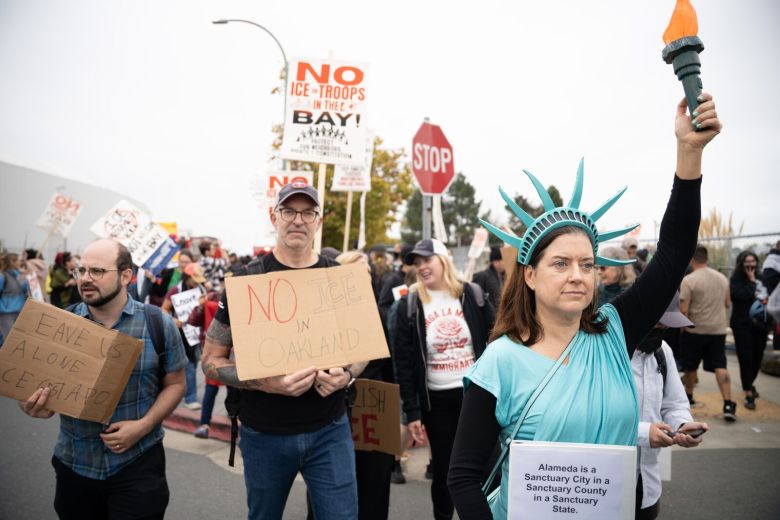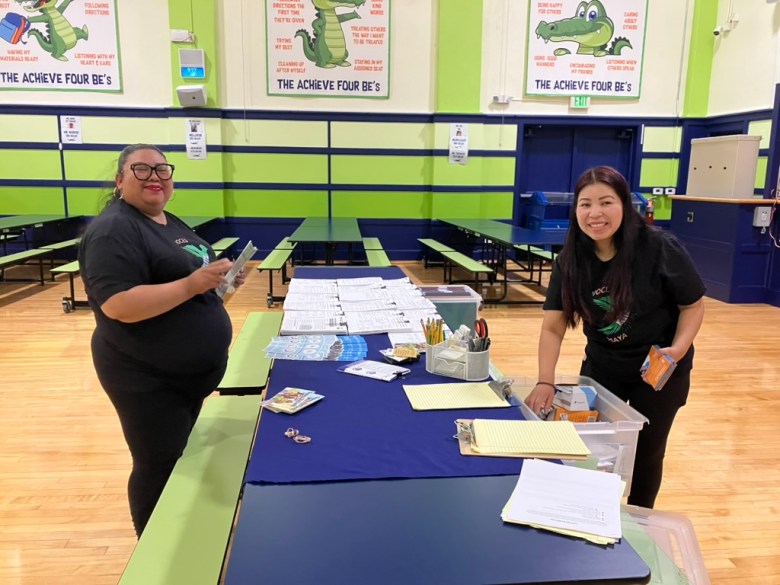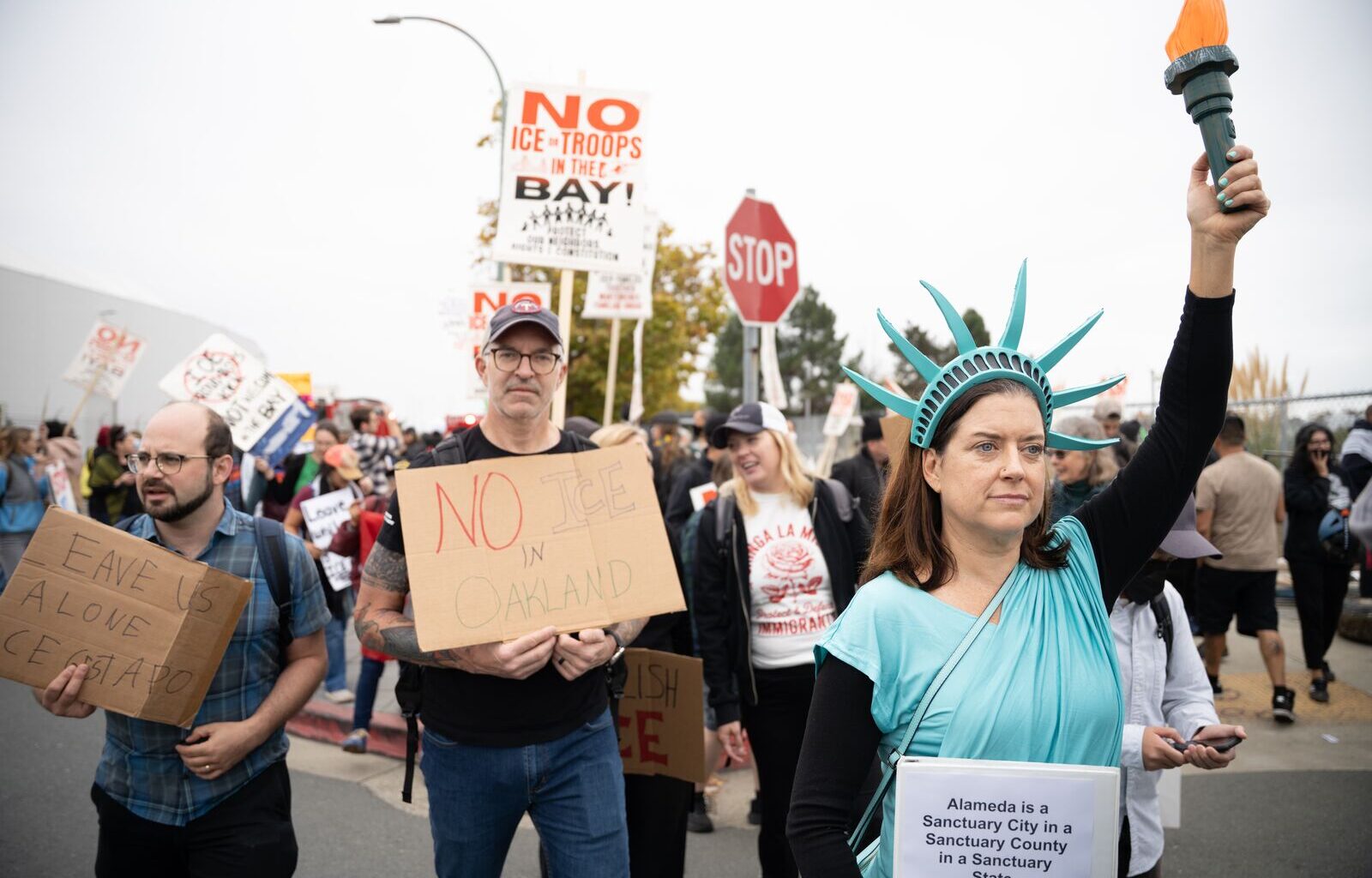 Protesters gather in Oakland near the bridge to Coast Guard Island, which is situated in the channel between Oakland and the city of Alameda, anticipating the arrival of Customs and Border Protection agents on Oct. 23, 2025. Credit: Florence Middleton for the Oaklandside
Protesters gather in Oakland near the bridge to Coast Guard Island, which is situated in the channel between Oakland and the city of Alameda, anticipating the arrival of Customs and Border Protection agents on Oct. 23, 2025. Credit: Florence Middleton for the Oaklandside
When Oasis Legal Services director of operations Leanne Brotsky first heard that federal immigration authorities could be arriving en masse in the Bay Area the week before last, she got a “pit-in-the-stomach feeling of all of the horribleness to come.”
Brotsky said the nonprofit’s clients were fearful, too. Oasis Legal Services, founded in Berkeley in 2017, provides dedicated spaces and holistic services to LGBTQ+ immigrants and is one of the largest providers of LGBTQ+ asylum services in the country. Oasis staff, including interns and volunteers, were also stressed and concerned for their families and the community.
“It felt like we were bracing for a lot of the ugliness that we had seen already happening across the country,” Brotsky said.
The arrival of federal Customs and Border Patrol agents early in the morning on Oct. 23 to Coast Guard Island in Alameda sparked protests and sent community advocates scrambling. But just as quickly as the situation had escalated, it quieted down: By the next day, local officials were confirming that the federal operation in the Bay Area had been called off.
In a message to Berkeley residents last Tuesday, Mayor Adena Ishii cautioned that although the surge had been canceled for now, Immigration and Customs Enforcement (ICE) was still active in the East Bay.
“We knew that it was only a matter of time when the East Bay would become a target of the Trump administration’s immigration policies and actions,” she said in the message. “However, that preparedness does not in any way take away the real fear and uncertainty that many in our community are experiencing.”
Friday evening, Berkeley Unified Superintendent Enikia Ford Morthel said in an update to the community that staff remain “cautious and mindful” of the possibility of future federal actions targeting immigrants.
Now more than a week since the called-off enforcement surge, Berkeleyside reached out to several East Bay immigrant rights and direct service organizations, including Oasis Legal Services, to understand how they are processing what happened, what they learned, and how it might shape their response to similar scenarios in the future.
East Bay Sanctuary Covenant: ‘A level of shock and fear that we hadn’t experienced before’
After catching wind of a potential Bay Area surge, East Bay Sanctuary Covenant staff held an emergency meeting, began gathering information from their networks, and contacting attorneys.
“It was such an intense moment for all of us,” Lisa Hoffman, the co-executive director, told Berkeleyside. “We’ve all been preparing the groundwork for the last 10 months and, thankfully, a lot of those systems of coordination in the community were already set up and ready to be kicked into action.”
 Two East Bay Sanctuary Covenant staff members set up a neighborhood clinic in late October to meet with immigrant community members to provide emergency legal and social services consultations. Courtesy: East Bay Sanctuary Covenant
Two East Bay Sanctuary Covenant staff members set up a neighborhood clinic in late October to meet with immigrant community members to provide emergency legal and social services consultations. Courtesy: East Bay Sanctuary Covenant
Within a day, the nonprofit was able to send information to people in its network using mass texts and social media posts in English and Spanish, and coordinate with other local groups and elected officials on messaging. One East Bay Sanctuary Covenant immigration attorney shared information with listeners on Radio B’alam, an online radio station based in East Oakland that serves the Mam-speaking Mayan community and has 100,000 followers on Facebook.
Hoffman said the threat of federal immigration enforcement caused “a level of shock and fear and worry that we really hadn’t experienced before.” Community members were unsure of the reports they were seeing on social media and wondered if it was safe to send their children to school. Staff members at East Bay Sanctuary Covenant were also worried about their own loved ones, she said.
Like some other immigrant service organizations in the East Bay, the nonprofit decided to pause in-person events, citing safety concerns. But they’re prepared to jump back into action, should federal actions resume in the region.
“Our initial priority is always how to keep our staff, our clients, and community members safe, and communicate clear information that does not create more panic and fear,” Hoffman said. “It was really beautiful to see our staff coming together and being ready to respond to this moment.”
Oasis Legal Services: ‘An unfortunate test, but a test that went well’
As events quickly developed, Oasis began receiving messages from clients asking what they needed to do to prepare in case of a federal enforcement surge. Brotsky said their first steps were to reinforce the organization’s ICE defense protocols and send out large-scale communications to the Oasis team and community.
“All of our clients have been on high alert for quite a while,” Brotsky said. “At this point for us, it feels more like when and not if there will be advanced immigration enforcement presence in the area.”
Brotsky said many Oasis staff and volunteers are from mixed-status homes and were concerned for their families while assisting others in the community during the federal threat. In the days that followed, clients and staff who were uneasy about traveling for appointments or work were given flexible options and offered remote alternatives.
“To be doing this work and to have some of those fears yourself is challenging,” she said. “There’s a lot of uncertainty and a lot of stress that takes a huge toll on our team.” Brotsky said Oasis is working to support its staff, “knowing that the work is not going to slow down.”
Brotsky said Oasis Legal Services welcomes volunteers and donations. “There’s a lot of work that needs doing,” she said. The organization is also taking on new clients.
“We have been doing a lot of work internally so that we could be as efficient as possible in reaching large numbers of clients, and making sure that we have quick, easy ways to communicate internally with our staff, our volunteers, and our interns,” she said. “I think this was an unfortunate test, but a test that went well.”
Social Justice Collaborative: ‘Spreading power, not panic’
Abigail Esquivias, the director of community partnerships and advocacy for the Berkeley-based Social Justice Collaborative, an organization that provides legal resources to people in removal proceedings, said the recent events at Coast Guard Island felt to advocates like “the moment we had been preparing for.”
Anticipating that news of a possible immigration surge in the Bay Area would spread fast in the community, Esquivias and other members of the organization quickly prepared themselves to respond to inquiries from worried residents and provide resources. The group also posted to its social media channels and sent out mass communications to its members.
Esquivias said the organization was ready to provide emergency legal advocacy, something they haven’t done historically, had there been a mass immigration enforcement action. When individuals are detained by ICE, she said, they’re often transferred to facilities in other states, which means advocates need to act quickly to file court petitions.
The Social Justice Collaborative has been hearing from many community members asking how they should prepare for federal actions, said Esquivias, and the organization has sought to respond in a manner that is “rooted in the idea of spreading power, not panic.”
“People are going to be worried about being out and about in the community, but unfortunately, it’s just not realistic for us to be able to tell people to stay at home indefinitely until this is figured out,” she said.
The organization recently restarted its court accompaniment program and is seeking volunteers. Interested people will be trained and paired up with an individual who needs support while attending court hearings or ICE check-ins. The Social Justice Collaborative also runs pro bono legal clinics.
“Folks are feeling really called to action right now, and I think that’s really powerful,” Esquivias said. “That’s how we respond to this moment: showing up for one another in any way that’s possible.”
We know that most readers don’t get to the end of the article. But you did! To support our in-depth, rock-solid reporting, please consider making a donation to our nonprofit newsroom today. We rely on our readers — particularly the ones who read the whole story!
“*” indicates required fields
